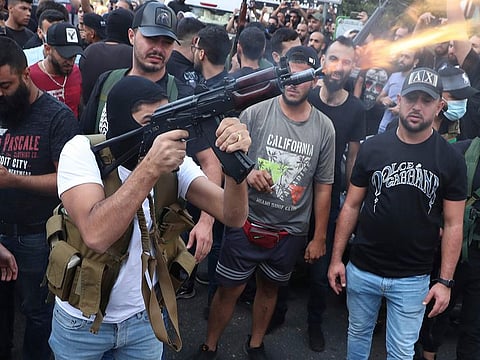What next for Lebanon? Is this the start of a new civil war, or just one of many bloody incidents
Much of it depends on how leaders of Hezbollah and Amal react during the next 48-hours

Damascus: Ordinary Lebanese are still in shock, trying to digest what they saw on the streets of Beirut yesterday.
Seven people were shot dead in broad daylight, and 32 were injured during a demonstration staged by Hezbollah and Amal. Images of young men carrying machine guns went viral on social media networks, and the two Shiite parties claim that they attackers were members of the Lebanese Forces (LF), an all-Maronite party that has long been critical of their policies in Lebanon and ties to Iran.
None of them has been apprehended or questioned, however, although their identities were clear to all as they did not even bother to cover their faces (one wore a surgical mask to protect himself from COVID-19).
Right after the shootings, hundreds of Hezbollah and Amal fighters took to the streets of Beirut, chanting “Shiite, Shiite, Shiite.” The confrontation happened at Ayn Al Rummanah, ironically, the very same neighbourhood were a bus shooting triggered the country’s civil war back in 1975.
Today the seven victims will be laid to rest at their towns and villages in Southern Lebanon. Those areas are predominantly Shiite and under the full control of Hezbollah and Amal, so there will likely be no confrontation during the funerals. But what happens next? Is this the start of a new civil war, or just one of the many bloody incidents of Lebanon, which will go by unchallenged, and for which nobody will get arrested or blamed?
De-escalation
Much of that depends on how the leaders of the two parties react during the next 48-hours. Nabih Berri is not only the leader of Amal but also, speaker of the Lebanese Parliament with strong ties to regional and international powers, ranging from Saudi Arabia and Iran onto Russia and the US. In as much as he would like to take revenge to please his constituency he also has an international reputation that he needs to live up to. He is likely to call for de-escalation, conditioning the removal of Judge Tarek Bitar, whose investigation into the Beirut port explosion triggered the entire bloodbath on Thursday.
The future of Judge Bitar
Since coming to power Tarek Bitar, 47, has named a handful of Lebanese officials as prime suspects in the port explosion, which killed 230 Lebanese, displaced 600,000 and tore down half of the city back in August 2020. The list is a cross-sectarian one, which has united the Lebanese political elite against Bitar.
It includes ex-Interior Minister Nouhad Al Machnouk (Sunni from Saad Hariri’s Future Movement), ex-Finance Minister Ali Hasan Khalil (Shiite from the Amal Movement), ex-Public Works Minister Ghazi Zeiter (Shiite member from the Amal Movement), and ex-Public Works Minister Yusuf Finianos (Maronite Christian from the Marada Movement). Also on the list is ex-Prime Minister Hasan Diab, a protégé of President Michel Aoun, who is accused of “criminal negligence” that led to the explosion.
They have all tried, with no luck, to remove Judge Bitar from office. They then tried seducing him with bribes and higher judicial positions, but that too failed. Last week, Bitar issued an arrest warrant for Ali Hassan Khalil, who in addition to being a former minister is also a current MP in the Lebanese Parliament. The demonstration at Ayn Al Rummanah by Hezbollah and Amal aimed at denouncing Bitar and calling for his removal, before things went horribly wrong.
On 15 October, the pro-Hezbollah newspaper ‘Al Akhbar’ said that the party’s first condition for the future is to “close the file (investigation) of madness that is being led by Tarek Bitar.” It also ran a front page picture of Samir Geagea, leader of the LF, wearing the uniform and toothbrush moustache of Adolph Hitler, underneath the words “No Doubt (that he ordered the killings).”
Hezbollah’s reaction
Hezbollah is not ready for a civil war. The core of its elite forces remain grounded in Syria and ever since sanctions were re-imposed on Iran back in 2018, Hezbollah has been in deep financial trouble. This is not the first time it sends its troops to the streets, however, although for years, Hezbollah had maintained that it would only use its arms against Israel.
In 2018, Hezbollah warriors overran the city of Beirut after the cabinet of then-Prime Minister Fouad Siniora tried to dismantle its telecommunications network at Rafik Al Hariri International Airport. They would love to do that again, although this time, the cost would be much higher. Among other things, Hezbollah leader Hasran Nasrallah would think twice before doing that, since it would belittle and completely discredit his ally, President Michel Aoun.
All sides seem to agree that the removal of Tarek Bitar is the only thing that can currently calm the situation and appease the political elite, mainly Amal and Hezbollah. But it will further enflame the angry Lebanese street, which is already in revolt and has been demanding change and accountability, even before the Beirut port explosion.
Sign up for the Daily Briefing
Get the latest news and updates straight to your inbox








